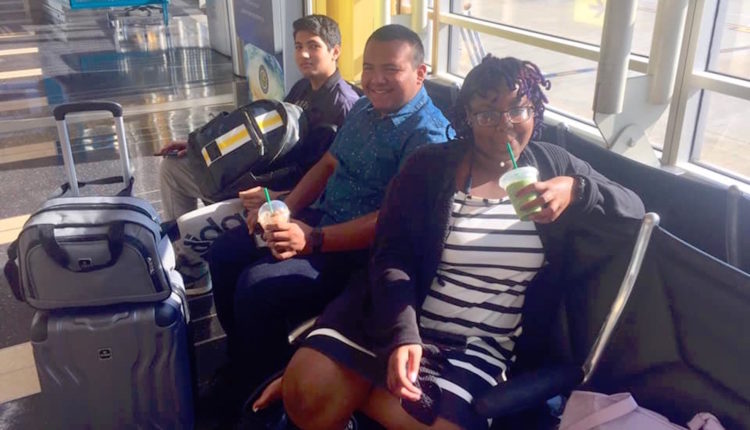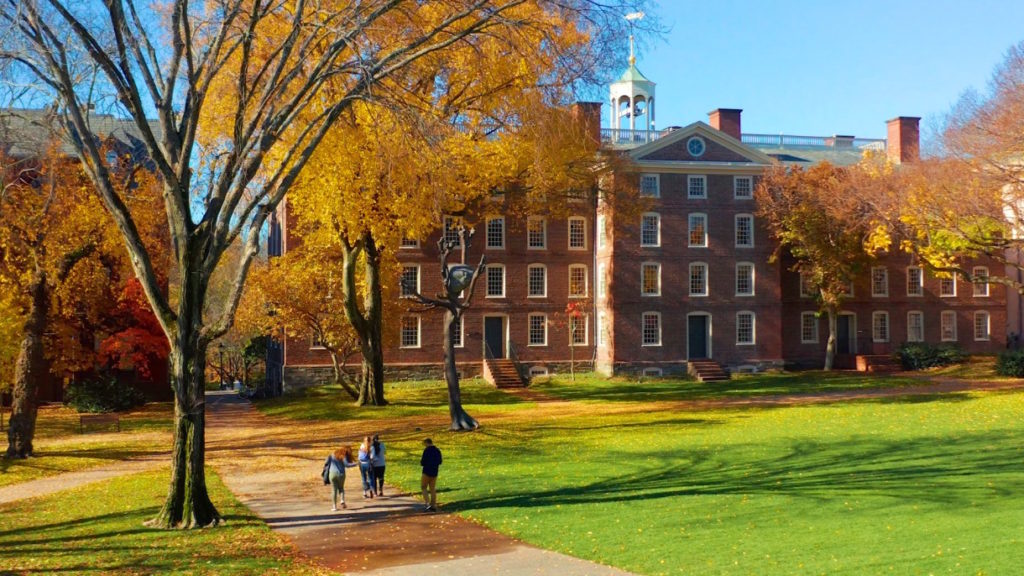
Summer enrichment program introduces standout DC students to life, opportunities at highly selective colleges
La’Rissa Dunn experienced a few surprises on her journey as one of 42 OSSE Scholars this summer — from a typo that made her think maybe she hadn’t been accepted into the program, to a college match she wasn’t expecting, to perplexing laundry circumstances.
But the first thing the senior at Columbia Heights Educational Campus (CHEC) mentions about her three-week sojourn in a pre-med program at Brown University? “I didn’t expect it to be as fun. … I thought it would be mainly just a bunch of work.”

It was a bunch of work that she signed up for — and competed with some 250 other District 10th- and 11th-graders last school year to take on — as part of the Office of the State Superintendent of Education Scholars Summer Enrichment Program. The program, which just completed its eighth year, pays for summer college experiences for academically motivated students in DC Public Schools or public charter schools who have a desire to attend post-secondary education but are financially challenged or would be first-generation college students in their families.
“We know that our students all across DC have such enormous potential, but some students may need more support in imagining what this next step after high school may look like,” said Superintendent Hanseul Kang. “We want to make sure they have that understanding of what will be expected of them and what it might feel like to be on a college campus, and strengthen their confidence in their ability to attend, and apply to attend, a selective or highly selective institution.”
The OSSE Scholars are able to get a sense of life on a campus such as Brown by participating in one of the summer college programs — sometimes billed as “pre-college” — that generally last from two to seven weeks and offer courses in a wide variety of liberal arts and sciences. Some universities offer college credit for completed summer programs.
While La’Rissa and two others studied at Brown, other 2019 participants attended programs at Syracuse University, Stanford University, Barnard College and Smith College, among others.
OSSE Scholars, with a $250,000 budget last year, is one of several initiatives run by Kang’s office focusing on career and college readiness.
The Summer Bridge Program focuses on facilitating college access for students experiencing homelessness. The Mayor’s Scholars program provides needs-based funding for DC residents pursuing their first associate or bachelor’s degree at 19 area colleges and universities.
The DC Tuition Assistance Grant (DCTAG) program —- the largest program, serving “between 4,000 and 5,000 students each year,” according to Kang — administers federal grants supporting eligible DC residents attending “over 300 colleges and universities” across the country, according to the DCTAG website.
“We know that, according to Georgetown University, three-quarters of the jobs in the DC region require some form of post-secondary education,” said Kang.
Roughly 2,000 DCPS students enrolled in postsecondary education within six months of graduating after the 2016-17 school year, according to the agency’s 2019-2023 Strategic Plan, which aims to increase that number considerably.
“One of those goals is that by 2023, we will have 1,100 more students each year who are accessing post-secondary education,” Kang said.
Tools to reach that mark include the college access programs that help students like La’Rissa imagine and pursue education after high school.
A 17-year-old Shaw resident, La’Rissa is the youngest of three siblings, with a brother and a sister (who is now a sous chef after graduating from a culinary college). Within CHEC, La’Rissa attends the Academy of Hospitality and Tourism and is also active in the Music Department.
La’Rissa and the 41 other DC students who became 2019 OSSE Scholars took their first steps toward their summer college experiences around this time last year. La’Rissa first heard about OSSE Scholars through an announcement at Upward Bound, another college-access program she participates in.
The application required financial and academic information; personal details from the students about their backgrounds, community activities and leadership qualities; and essays about why they wanted to be in the program and which college summer programs they were most interested in.
About two months later, she was informed that she had progressed to the interview phase, she recounted. But when she consulted the schedule of interviews to be held at her school, her name didn’t appear. “I was confused and I was starting to think that I actually didn’t get into the next round.”
She reached out to her school counselor as well as to Janel Young, the program manager at OSSE. “It turned out to be a typo mistake,” she said. “They just forgot to put my name [on the list]. So I was really relieved.”
A few months later, she was excited to learn that she had been accepted into the program. She also got another surprise: Though she had written about Harvard’s and Northwestern’s medicine-focused programs in her application and talked about Cornell in her interview, she was ultimately matched to the Summer@Brown program. So she had some additional research to do.
Once students are accepted as OSSE Scholars, they must separately apply to the programs they’ve been matched to. After the competitive nature of the Scholars application process, La’Rissa said she actually found the Brown application to be somewhat easier (according to OSSE, more than 97% of Scholars are accepted into their matched program).
OSSE currently partners with 13 highly selective colleges and universities across the country — including a number of Ivy League schools — and pays the bulk of expenses for students’ summer college participation, including tuition, room and board, books, and travel to and from the institutions.
The focus on highly selective institutions is intentional and, according to Kang, supports the goal of encouraging students to aim high in their ultimate plans for post-secondary education.
“One of the things we are trying to address is the phenomenon that can sometimes happen of ‘under-matching,’ where students may not be considering the full universe of selective institutions that they may actually be fully qualified for, but just may not have considered fully,” she said. “We’ve seen our OSSE Scholars apply for and be accepted at truly excellent colleges and universities.”
The program has seen alumni go on to receive full tuition scholarships to institutions such as Duke University, George Washington University, University of Chicago, University of Rochester and University of North Carolina-Chapel Hill, among others.
By participating in the summer programs, the students get a feel for what it’s like to live on campus and become familiar with the routine of a college student. In addition to figuring out how to deal with heat wave conditions, community showers and malfunctioning washing machines, La’Rissa learned that she needed to adjust her customary time-management strategies to make the best use of her non-classroom hours.
“I think the most memorable part of my experience was getting used to how to utilize that, and how to pace myself into doing my work,” she said. “It was kind of like getting used to what my body could do and couldn’t do. And also a way to, like, keep me happy and centered so I wouldn’t get too stressed out, because the workload was a lot heavier than I thought it would be.”
Getting practical advice about everyday matters like those is one of the benefits of having program alumni come back to talk to new Scholars before they embark on their summer journeys. The fact that they’ve applied to become Scholars indicates the thought these ambitious students have already put into the big-picture issues of their education. But they have a lot of practical questions on their minds, too, and the alumni are well-suited to help them with those concerns. Kang said these are the sorts of questions ”that might otherwise … feel awkward to bring up. But to talk about it with a peer was really important.”
Now, with her Summer@Brown over, La’Rissa has begun her last year at CHEC and turned her attention to her college applications and the next phase of her education. Pre-med at Brown is definitely in the mix, as are the medical programs at Johns Hopkins and George Washington.
Strong liberal arts programs at Georgetown, George Mason and Bowdoin have also caught her attention. As has Harvard: “They’re a really challenging school and I want to … give myself a challenge, to see if I’m able to do certain things, so I can step outside of my comfort zone.”
Her advice to the next class of Scholars? Be confident, but don’t be afraid to ask for help when you need it.
“I would say if you’re having a problem or if you just need to, like, have a simple question answered, just make sure you’re not afraid to talk to [program manager] Ms. Young, because she’s really, really nice and she’s very good at helping different people in different circumstances,” she said. “And also, just to be able to talk to different people in your program and … not be intimidated by how big it is and how many people are in it.”


Comments are closed.